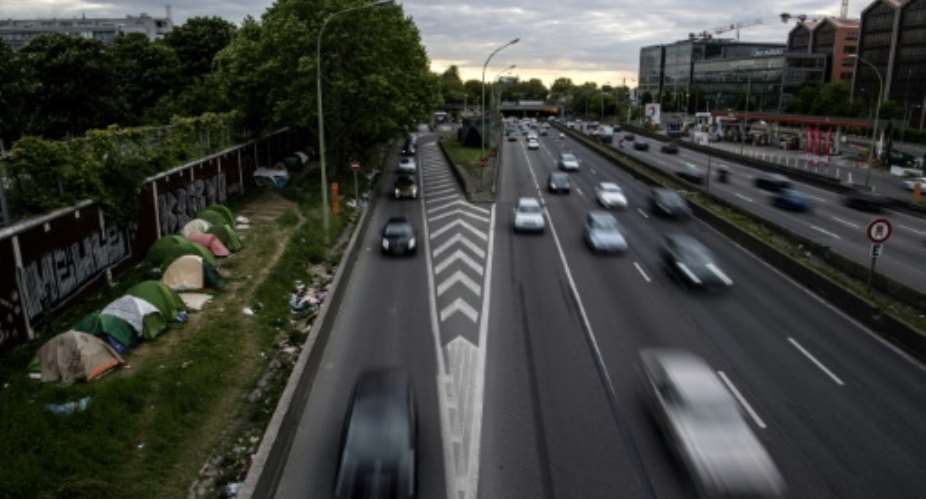Along the ring road northeast of Paris, hundreds of migrants huddle in rows of tents covered in tarps or blankets as a blur of cars race by just a few metres away. AFP photographers have documented their lives.
"We go to sleep at around 3:00 am, when traffic starts to go down," Ahmed, a Somali who has been living under an overpass near the Porte d'Aubervilliers for two months, told AFP.
Usually only drivers in passing vehicles can see the makeshift shelters, where clothes are draped on concrete railings or hung from metal fences to dry, children ride bikes and infants in strollers nap as women make a meal.
 The makeshift camps are regularly cleared by French authorities, but migrants quickly return to the medians and overpasses on Paris motorways. By Christophe ARCHAMBAULT (AFP)
The makeshift camps are regularly cleared by French authorities, but migrants quickly return to the medians and overpasses on Paris motorways. By Christophe ARCHAMBAULT (AFP)
"It's like we're invisible," Ahmed says.
For years migrants had been massing on canal banks or along unused rail lines in the north of the capital, some hoping for asylum, others fleeing at the first sign of police to avoid expulsion.
But in recent months authorities have cleared many of the camps as they swelled in size, after residents complained of trash and the acrid smoke of cooking fires.
"They don't let us stay in front of the social centre," said Hana, a Sudanese woman watching over her children, aged 2 and 4, outside her tent along an exit ramp off the ring road.
 Somalis having an evening meal at their camp at the Porte d'Aubervilliers. Local residents have complained about the acrid smoke of migrants' cooking fires.. By Christophe ARCHAMBAULT (AFP)
Somalis having an evening meal at their camp at the Porte d'Aubervilliers. Local residents have complained about the acrid smoke of migrants' cooking fires.. By Christophe ARCHAMBAULT (AFP)
She is supposed to meet a social worker soon, "so maybe we'll be moved into an apartment," she said.
Most of the migrants stick together by country of origin.
"Here, it's Somalia. Over there is Eritrea and Ethiopia," said Omar, adjusting the plastic sack he uses to sit on the damp grass.
 Hana, a Sudanese refugee living in Paris with her two children, aged 2 and 4, arranges clothing on a wall overlooking the Paris ring road. By Christophe ARCHAMBAULT (AFP)
Hana, a Sudanese refugee living in Paris with her two children, aged 2 and 4, arranges clothing on a wall overlooking the Paris ring road. By Christophe ARCHAMBAULT (AFP)
The authorities have started to clear these new camps as well, last Friday taking in around 200 people at the Porte d'Aubervilliers, mostly Afghans.
"We don't need money. In Afghanistan my family had three cars," Marzban told AFP the night before the evacuation.
"But we couldn't stay because of the insecurity," he said, adding that he had come to Paris after being expelled from Austria.
A few days later, around 50 tents had already reappeared at the site.
Mayor Anne Hidalgo last month denounced "chaos" on the outskirts of Paris, accusing the government of being "in denial" about the city's needs for accommodating an estimated 900 to 1,800 people in various camps.
A new record of nearly 124,000 asylum requests were filed across France last year, a 23 percent jump from 2017.
Of those, the government's Ofpra migrant protection agency granted refugee status to 46,700 people.
President Emmanuel Macron's government enacted last August a new immigration law that speeds up the asylum process but also accelerates deportations.





 Former Kotoko Player George Asare elected SRC President at PUG Law Faculty
Former Kotoko Player George Asare elected SRC President at PUG Law Faculty
 2024 elections: Consider ‘dumsor’ when casting your votes; NPP deserves less — P...
2024 elections: Consider ‘dumsor’ when casting your votes; NPP deserves less — P...
 You have no grounds to call Mahama incompetent; you’ve failed — Prof. Marfo blas...
You have no grounds to call Mahama incompetent; you’ve failed — Prof. Marfo blas...
 2024 elections: NPP creates better policies for people like us; we’ll vote for B...
2024 elections: NPP creates better policies for people like us; we’ll vote for B...
 Don’t exchange your life for wealth; a sparkle of fire can be your end — Gender ...
Don’t exchange your life for wealth; a sparkle of fire can be your end — Gender ...
 Ghana’s newly installed Poland train reportedly involved in accident while on a ...
Ghana’s newly installed Poland train reportedly involved in accident while on a ...
 Chieftaincy disputes: Government imposes 4pm to 7am curfew on Sampa township
Chieftaincy disputes: Government imposes 4pm to 7am curfew on Sampa township
 Franklin Cudjoe fumes at unaccountable wasteful executive living large at the ex...
Franklin Cudjoe fumes at unaccountable wasteful executive living large at the ex...
 I'll 'stoop too low' for votes; I'm never moved by your propaganda — Oquaye Jnr ...
I'll 'stoop too low' for votes; I'm never moved by your propaganda — Oquaye Jnr ...
 Kumasi Thermal Plant commissioning: I pray God opens the eyes of leaders who don...
Kumasi Thermal Plant commissioning: I pray God opens the eyes of leaders who don...
